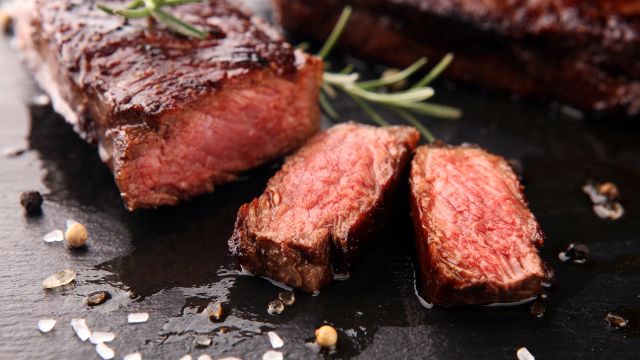Updated on August 3, 2023.
Should you put red meat out to pasture?
For years, you’ve probably heard the advice: Choose leaner proteins such as poultry, fish, and plant-based foods like nuts and beans. But if you’re a steak lover, you’re probably wondering if red meat is really so bad for you—when it tastes so good.
There is mounting evidence of the environmental and health risks associated with eating too much red meat. In fact, a large 2019 study published in The BMJ examined how changes in red meat consumption could influence the risk of dying early.
For the study, researchers analyzed the eating habits of more than 81,000 United States health professionals, focusing on data compiled over the course of 16 years.
The authors found that people who increased their intake of unprocessed red meat by at least three and a half helpings per week in the first eight years were 9 percent more likely to die within the next eight years than those who had little or no change in their red meat intake. When the meat was processed (think bacon, hot dogs, deli meats, and the like), the risk was 13 percent higher. The leading causes of death included heart disease, lung disease, and degenerative brain disease. The researchers noted that replacing some red meat with whole grains, veggies, and other leaner animal proteins such as skinless chicken, eggs, or fish may be linked to a lower risk of death.
So, is it finally time to go cold turkey on that juicy beef tenderloin once and for all? Not necessarily.
Aside from being packed with protein, red meat is one of the best sources of dietary iron. That’s especially good for pregnant or menstruating women whose iron levels may be low, says Jay Patel, MD, a cardiologist with Hamilton Cardiology Associates and chairman of the department of cardiology at St. Francis Medical Center in Trenton, New Jersey.
Overall, plant-based proteins are a healthier choice, but most people could safely include a limited amount of lean, unprocessed red meat in their diet, Dr. Patel advises. But it’s important to make informed decisions about your red meat consumption because there are some specific concerns associated with it, including:
Saturated fat
Red meat—including beef, lamb, and pork—contains saturated fat, which can raise your low-density lipoprotein, also called LDL or “bad” cholesterol. These blood fats can build up in your arteries and form plaques that may block blood flow. High LDL levels are a major risk factor for heart attack and stroke.
Keep in mind, white meat also contains some saturated fat. A 2019 study published in the American Journal of Clinical Nutrition questioned longstanding wisdom that chicken and other poultry were better for your heart than red meat.
Researchers wanted to find out how different proteins could affect blood fats—including LDL cholesterol. Participants in the study were asked to follow three different high-protein diets for four weeks each: non-meat (featuring beans, nuts, and soy), red meat, or poultry. Both meats used in the study were lean and contained virtually the same amount of saturated fat.
The researchers asked roughly half the people to eat a high-saturated fat diet made up of things like full-fat dairy and butter. The other half ate a diet that was low in saturated fat.
Not surprisingly, the plant-based proteins raised cholesterol the least. When it came to the meat diets, though, both red and white raised cholesterol almost identically no matter how much other saturated fat was in the diet. It’s important to note that people in the high saturated fat group had worse cholesterol than those in the low-fat group regardless of the kind of protein they ate.
The findings were underscored by a separate, large study published in JAMA Internal Medicine in 2020. Researchers found that participants who ate two servings or more per week of red meat, processed meat, or poultry—but not fish—were slightly more likely to develop cardiovascular disease.
“It doesn’t matter whether you eat white meat or red meat—they both contain saturated fat and are going to raise your cholesterol,” Patel explains. What makes the difference is how much meat you eat and the amount of saturated fat in it, he adds. Ounce for ounce, most red meats have more saturated fat than poultry, fish, and other vegetable proteins.
TMAO
Eating red meat could contribute to heart disease in some other ways. For example, bacteria in your digestive tract are involved in the production of a chemical called trimethylamine N-oxide (TMAO) from dietary lecithin, which is plentiful in red meat and some other foods.
A study published in the European Heart Journal in 2019 found that daily red meat eaters had, on average, triple the amount of TMAO in their blood than white meat-eaters or people who got their protein from plants. The researchers also found that when meat eaters switched to either white meat or plant-based protein sources their TMAO levels dropped significantly within about one month.
Research also suggests there is a link between higher TMAO levels and heart disease as well as a greater risk of heart attack, stroke, or death.
“The current thinking is that TMAO could be what’s responsible for inflammation which is an independent risk factor for coronary heart disease, heart attacks, and strokes,” Patel says. But he doesn’t urge you to go out and get tested for it. He says more research is needed to find out at what level of TMAO might pose a risk to heart health and then how to treat it.
Heme iron
Red meats are associated with 5.4 percent of all cases of colorectal cancer, according to the American Cancer Society (ACS). Mounting research suggests that risk for the disease may go up for those who consume more than 18 ounces of red meat per week, the American Institute for Cancer Research also reports. Meanwhile, salted, cured, smoked, and other processed meats, including some deli meats, bacon, and hot dogs, are also linked to a greater risk for both stomach and colon cancer.
Although experts aren’t exactly sure why, the connection may be related to carcinogens that form when the meat is cooked at high temperatures or charred on the grill. It may also be tied to the amount of heme iron it contains. Heme iron, or iron that comes from animal proteins, may trigger the production of cancer-causing compounds.
How much red meat is too much?
When deciding what’s right for you, it’s important to consider the type of red meat you’re consuming as well as how much and how often you’re eating it. It’s also important to consider how it’s prepared.
Leading health organizations, including the ACS and the American Heart Association (AHA), recommend that people limit how much red meat they eat and opt for unprocessed, leaner cuts with less fat. So, if you choose to incorporate red meat into your diet, try to do the following:
Choose wisely. An average adult who needs about 2,000 calories per day shouldn’t consume more than 13 grams of saturated fat daily, according to the AHA. To put this into perspective, a 3-ounce portion of regular ground beef contains about 6 grams of saturated fat. A 3-ounce portion of extra lean ground beef, on the other hand, has only about 2.6 grams of saturated fat. Whenever possible, opt for extra lean cuts of beef, including eye round, top round, round tip, bottom round, and sirloin.
Limit your portion. Go ahead and eat a steak or a pork chop if you want to, Patel advises, but it shouldn’t take up most of your plate. If you choose to eat red meat, limit your portion (red or white) to no more than 3 ounces (about the size of a deck of cards).
Fill up on veggies. Red meat shouldn’t fill your plate—but vegetables should. Load up with a variety of vegetables like cabbage, broccoli, and leafy greens, Patel points out.
Be mindful about preparation. Be sure to trim excess fat off your meat before cooking, according to the AHA. It’s also important to use healthy cooking techniques. That means bake, broil, stew, or roast your meats as much as possible. Don’t fry them and avoid charring meats at high temperatures on the grill.
Also consider the fact that what’s right for you may be different from someone else. If you have a family or personal history of heart disease or colon cancer, you should be aware that red meat may increase your overall risk, Patel cautions.
Even if you have some risk factors for heart disease or cancer, red meat may not be completely off limits, he notes. Talk to your doctor about what’s best for you.
The one exception: fast food burgers. “Just wave at the McDonald’s and Burger King,” Patel says, “and keep on walking.”







